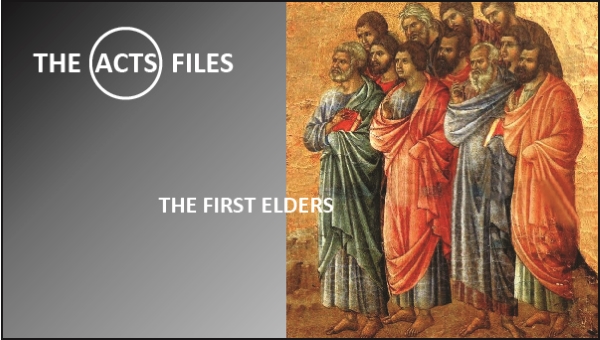By Tyson Thorne

Before continuing into chapter 15, we need to stop and look at a remarkable event that happened on Paul and Barnabas’ return journey. For the first time the term “elders” is used in church history. Examine the passage carefully:
They strengthened the souls of the disciples and encouraged them to continue in the faith, saying, “We must enter the kingdom of God through many persecutions.” When they had appointed elders for them in the various churches, with prayer and fasting they entrusted them to the protection of the Lord in whom they had believed.
First, notice that those who follow Jesus are still called disciples. We’ve moved away from such terms in the English-speaking church for two reasons. The first is the term has a cultural stigma, it reminds us of cults, organized groups of people who follow a false religious figure or teaching. The second reason is also cultural, but on a broader scale. Since the term “Christian” has become so watered down in our society, Pastor-teacher Chuck Swindol in the late 1980’s tried to popularize the term “Christ-follower” to describe those committed to the teachings of Jesus. The term embodies the same notion as disciple without the cult-like innuendo, yet it never caught on broadly. Why? As Americans we like to think of ourselves as capable of living life on our own and by our own leading. The term disciple, or Christ-follower, encompasses the idea of being a follower rather than a leader and that rankles against our independent nature. As we mature in our relationship with God we come to accept his leading, and it is something perhaps the modern church should teach with greater conviction.
Second, notice the apostles “encouraging words”: We must enter the kingdom through many persecutions. What is so encouraging about that? Remember what Paul and Barnabas had just been through. Paul was condemned to death and had rocks thrown at him until the crowd believed he had been killed. The Messiah-movement wasn’t one whereby the new recruits are asked to endure hardship while leadership enjoys the easy life. The leadership in this case had their lives threatened and they considered it commendable that they should suffer for Jesus.
Third, because of the danger in being a disciple of Jesus, the apostles thought it wise to appoint protectors within each church. These men they called “elders” and their duty was to protect the rest of the Christ-following community. This is not physical protection; the elders were not like the temple guard. Instead they were to be men who had an advanced knowledge of the Scriptures and could keep false teachings from infiltrating the church in their care. We come to a more full understanding of this duty in Titus 1.9:
He must hold firmly to the trustworthy message as it has been taught, so that he can encourage others by sound doctrine and refute those who oppose it.
Finally, we are to understand that this is now an official office of the church. Notice how the elders were commemorated into service, though prayer and fasting – the same way Paul and Barnabas were prepared and sanctioned for their first missionary journey. Notice also that the elders are called together in Acts 20.17, revealing that this office was a permanent fixture and not simply meant to assist the early church. This office is distinct from the apostolic office, devoted to teaching and to prayer, and the office of deacons, who served as arbiters of the believers and organizers of charitable ministries.
To serve as an elder in the church today is as noble a thing as one can do. It requires much from the individual and his family as later New Testament passages reveal (see Titus 1.6-9 and 1 Peter 5.2-.4 for examples). These men shape the culture and atmosphere of the local church and are deserving of respect and our prayers.
|
|
|
